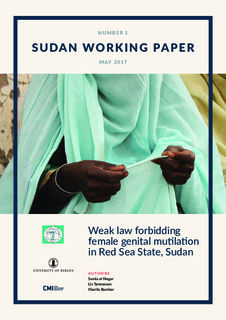| dc.contributor.author | al-Nagar, Samia | |
| dc.contributor.author | Tønnessen, Liv | |
| dc.contributor.author | Bamkar, Sharifa | |
| dc.date.accessioned | 2018-01-04T08:23:41Z | |
| dc.date.available | 2018-01-04T08:23:41Z | |
| dc.date.issued | 2017-05-01 | |
| dc.identifier | oai:www.cmi.no:6229 | |
| dc.identifier.citation | Bergen: Chr. Michelsen Institute (Sudan Working Paper no. SWP 2017:1) 16 p. | |
| dc.identifier.isbn | 978-82-8062-629-5 | |
| dc.identifier.issn | 1890-5056 | |
| dc.identifier.uri | http://hdl.handle.net/11250/2475440 | |
| dc.description.abstract | This paper critically investigates the criminalization of female genital mutilation/cutting (FGM/C) in Red Sea, a state with one of the highest prevalence rates of FGM/C in Sudan (where 89% of females have undergone the procedure). Infibulation, also called “pharaonic circumcision” or “kushabi,” is the most severe type of FGM/C is widely practiced in Red Sea, especially among conservative tribal groups such as the Beja tribe and its subgroups Hadendawa and Beni Amer. These tribal groups played a key role in keeping criminalization of FGM/C out of the Red Sea State Child Act of 2007. Although the act was revised in 2011 to address FGM/C, it does so only weakly and does not clearly prohibit the most severe types of FGM/C. In essence, conservative political forces in Red Sea have been able to shape the legislative process. | |
| dc.language.iso | eng | |
| dc.publisher | Chr. Michelsen Institute | |
| dc.relation | Sudan Working Paper | |
| dc.relation | SWP 2017:1 | |
| dc.relation.ispartof | Sudan Working Paper | |
| dc.relation.ispartofseries | Sudan Working Paper SWP 2017:1 | |
| dc.relation.uri | https://www.cmi.no/publications/6229-weak-law-forbidding-female-genital-mutilation-in | |
| dc.subject | Female Genital Mutilation | |
| dc.subject | Cutting | |
| dc.subject | Pharaonic Circumcision | |
| dc.subject | Circumcision | |
| dc.subject | Kushabi | |
| dc.subject | ARUSS | |
| dc.subject | Red Sea | |
| dc.title | Weak law forbidding female genital mutilation in Red Sea State, Sudan | |
| dc.type | Working paper | |
